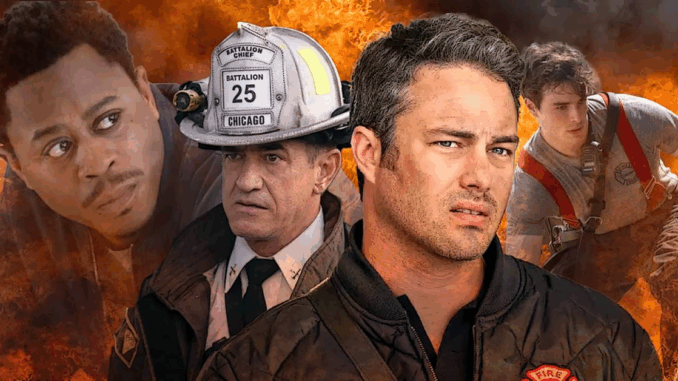
A Ratings Powerhouse with a Hidden Problem
On paper, Chicago Fire Season 13 is a success story. It continues to dominate NBC’s primetime lineup, boasting strong viewership and a loyal fanbase. Yet behind the high ratings, the show is quietly facing significant challenges. Despite its consistent performance, creative stagnation, a string of cast departures, and a noticeable drop in emotional engagement reveal a hidden struggle beneath the surface.
The paradox is striking: the audience isn’t tuning in for fresh storylines or groundbreaking plots—they watch out of habit and affection for a show that has been part of their lives for over a decade. But loyalty has its limits, and if the series doesn’t evolve, it risks alienating the very fans who’ve kept it at the top.
The Cast Exodus: Firehouse 51 Faces a Revolving Door
A show is only as strong as its characters, and Season 13 has seen several key departures. Long-time chief Wallace Boden (Eamonn Walker) is gone, alongside popular figures like Darren Ritter (Daniel Kyri) and Sam Carver (Jake Lockett). These exits are more than minor changes—they point to deeper problems within the show’s structure.
Ritter’s growth from shy rookie to respected firefighter, and Carver’s struggles with sobriety and romance, were fan favourites. Their departures, reportedly due to budget constraints, have shaken the ensemble and risked breaking the audience’s emotional connection. Repeated cast instability makes it difficult for viewers to invest in new characters, creating a sense of detachment from Firehouse 51.
Creative Stagnation: Recycled Storylines and Déjà Vu
For a show that’s been on air for years, some repetition is inevitable—but Season 13’s recycled plots are particularly noticeable. Classic storylines, like characters studying for lieutenant or captain exams, reappear without the tension or stakes that once made them exciting.
Relationship drama suffers similarly. Violet and Carver’s romance, while compelling, echoes previous “will-they-won’t-they” arcs, leaving viewers feeling a sense of déjà vu. The creative erosion highlights a struggle to deliver fresh, engaging narratives—a core reason for the quiet frustration among fans.
Silent Failures: Lost Buzz and Mixed Reviews
While Chicago Fire maintains strong ratings, it no longer generates the same cultural buzz it once did. Social media chatter reflects fan dissatisfaction, particularly regarding repetitive plots and character departures. Critical reception has been mixed; some praise the show’s reliability, but many note its creative stagnation and inability to innovate.
This form of “secret” failure doesn’t appear on-screen but has a profound effect on the show’s long-term relevance. A loyal audience can sustain ratings temporarily, but declining engagement threatens its position as NBC’s flagship drama.
Financial Pressures and Behind-the-Scenes Strains
The show’s high production costs and ensemble cast make budget management a constant challenge. Recent cast cuts suggest NBC is trimming expenses, forcing difficult creative decisions that impact storytelling. Veteran stars are now in contract negotiations, creating further uncertainty.
These financial constraints can reduce the quality of character-driven narratives and stunt innovation, highlighting another way the show is struggling quietly despite outward success.
Looking Ahead: Can Firehouse 51 Recover?
The road ahead is challenging. Chicago Fire must balance honoring its legacy with embracing fresh, compelling storylines. Investing in characters, developing new relationships, and creating high-stakes drama are crucial to maintaining viewer loyalty.
Without addressing these underlying issues, even the top-rated drama on NBC risks losing its audience and relevance. Season 13 may be a reminder that ratings alone don’t guarantee long-term success—creative vitality and fan engagement are just as essential.
